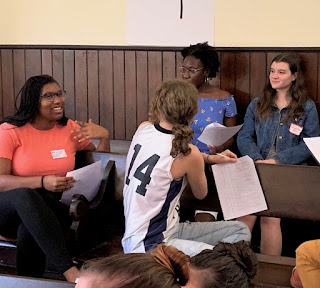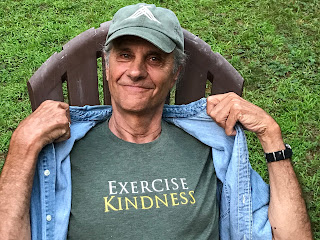Looking Back to Move Forward:Timeless Meeting Tips from the 17th Century
By Molly Kuehn Watson
Before my son ended up in a Quaker school, sadly all I knew about Quakers was based on the image on the front of the oatmeal buried at the back of my pantry. Beyond the hat on the guy with the fuzzy hair, I knew nothing about the beliefs and values of this non-religious religion founded in 17th century England. For the last three years, I have served as a trustee of a small Quaker school in the Philadelphia suburbs that educates bright children with learning differences. In the process, I have come to deeply appreciate what George Fox had in mind when he founded the Religious Society of Friends in 1647.
When my youngest child was diagnosed with multiple learning differences that could not be adequately addressed in public school, we had to find a private school that could unlock his potential. We chose the Quaker school for the very specific training of their faculty, but perhaps more importantly everyone we met was calm, kind, and thoughtful. At the time I paid no mind to the Quaker piece of the equation, I just wanted a place where he could finally learn, make a few friends, and restore the confidence he had lost. By his second year there I was asked to join the board of trustees and, after a year of service, was asked to serve as the clerk. Clerk is the Quaker term most resembling chairman in that it is a leadership role. After almost a decade in the C-suite, twenty years in corporate officer roles, and a handful of other board positions, I thought I knew how to run a very effective meeting; my tool chest was amply fortified. I knew from the moment I sat down at my first Quaker school trustee meeting that I had much more to learn.
The Friends approach to run meetings almost defies what we know happens in corporate boardrooms on the regular. Most of you know what kind of meetings I’m referring to: attendees rush in from their last meeting, a few straggle in late, one or two people drive the meeting agenda, a handful of others join the conversation, some sit back with their heads buried in their phones barely contributing, progress is measured by a few folks agreeing to next steps and then meeting ends. If there is discord among the group, it is more likely to surface at the Keurig machine later that day. Word gets back to the boss and another meeting ensues. Wash, rinse, repeat. So how do we break this bureaucratic cycle and make meetings more effective, productive, and less robotic? I say we try it like the Quakers.
The core of the Friends’ ethos is the belief that each human being is of unique worth. A simple and compelling concept that is often lost in the mayhem of the daily rat race. With that as the fundamental Quaker compass, business meetings are designed to create environments for active, productive listening, individual expression, and interim decision-making. Here's what I have learned.
- Open with a Moment of Silence: Quaker meetings, both religious and business, always begin with a moment of silence. The first time I experienced this as a trustee I skeptically half-closed my eyes and squinted, peeking around the room trying to figure out what this was all about. Some people had heads bowed, a handful gazed off in the distance, while others sat stone-still, eyes closed. It lasted maybe twenty (long) seconds until the clerk spoke and began the meeting. The Quakers use this as a way for attendees to quiet the busy, anxious, thinking part of their minds and become not merely outwardly, but inwardly silent. This allows your mind to be open to what you hear, internally and externally. Nowadays, we call that mindfulness. I have found that even a brief moment of silence at the top of a meeting helps flush out what I walked in with and provides space for greater focus. What was once awkward for me is now something I look forward to knowing I will bring a better version of myself to the meeting than perhaps I rushed in with.
- Decision-making via Consensus: Collaboration, alignment, and “in lockstep” are modern memes for how to drive team decision-making today. I invite you to consider genuine consensus. When I began clerking the Friends’ school board I learned that we were not seeking unanimity, which is agreement without dissent. The goal was unity; agreement that acknowledges dissent, staying together despite differences, and moving forward with guidance from common values. Because of this, there is never a vote. Instead, it is critical to get a sense of the meeting through words, participation, body language, action, and intuition. I learned to slow down the process of closure on an issue and let it breathe a bit before moving on, consistently seeking feedback from all, especially the quiet ones. A good way to think about the differences is with majority voting we ask, "How do we vote?" With consensus, we ask, "What can we agree to?” In this case, agreement is powerful, meaningful, and ensures a sincere commitment to support the final decision.
- Revelation is Continuous: We have become accustomed to solving complex problems faster than ever before. Technology, access to endless information, unrealistic deadlines, and too much caffeine fuel our daily progress. Don’t get me wrong, I’m not saying those decisions are always wrong or inadequate. What I have learned is that sometimes we just don’t know the answer at the exact moment. The Quakers believe that revelation is continuous and if the answer you seek is not obvious, it will show itself over time. I know this to be true from thirty years in leadership positions. One of the most important things I learned is to admit, “I don’t know right now, so let’s simply figure out the next few steps and we will know more as we progress.” Allowing ourselves a bit of time is a lost art and, in my experience, almost always results in a better way.
I have found that these three simple tactics do yield more focused meetings, where all participants are more engaged, feel valued, and are comfortable admitting uncertainty. Today we may call it mindfulness, team building, and leadership vulnerability. Seems to me the Quakers had it all figured out even without iPhones, business coaches, or corporate retreats. Sometimes the most obvious things are the hardest to see.
Molly Kuehn Watson is Clerk of the Board of Trustees at Delaware Valley Friends School.



Comments
Post a Comment